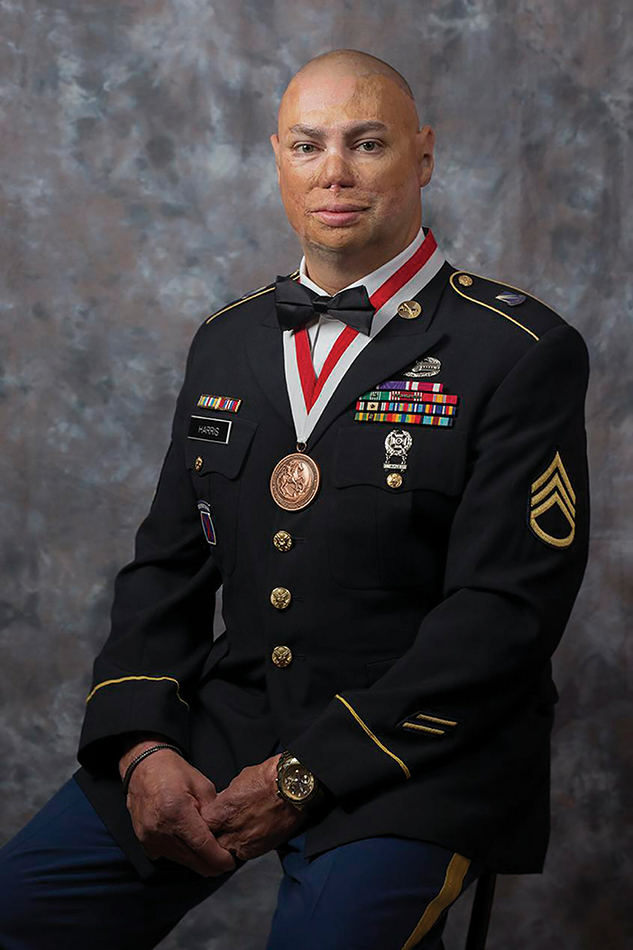
Whether it’s pride, pain, inspiration, nostalgia or a combination of sentiments, any time veterans tell their stories, there’s a good chance they’ll evoke strong emotions from both the tellers and their audiences. Those feelings are often well-warranted as many veterans have been through intense experiences in the name of service to their country.
United States Army Staff Sergeant Shilo A. Harris’ story is no exception.
Although he wanted to be a soldier his entire life, it wasn’t until after the terrorist attacks of Sept. 11, 2001 that Harris felt compelled to enlist in the Army. He went to basic training at age 27 and began his career as a cavalry scout stationed in Germany. During his second deployment to Iraq, his life forever changed.
On Feb. 19, 2007, Harris was on patrol when his military vehicle struck an improvised explosive device (IED). The estimated 700-pound IED, which was buried in the road, blew the vehicle “to pieces,” killed three soldiers and critically injured Harris and the vehicle’s driver.
While he survived the explosion, Harris spent the next 48 days in a medically induced coma while doctors worked to heal the third-degree burns covering 35% of his body and multiple fractured bones. Harris lost both ears, three fingers and the tip of his nose. He underwent more than 75 surgeries and three years of intensive rehabilitation to regain basic abilities and maintain an independent lifestyle.
Harris retired from the Army in 2010 and is determined to keep a grateful outlook despite struggling with post-traumatic stress and ongoing care needs.
“I do have bad days, but for the most part I live my life because life is worth living,” Harris said.
He now shares his experiences through motivational speaking and writing books. He also submitted his oral history to the Library of Congress Veterans History Project (VHP).
The Veterans History Project is a national effort to collect, preserve and make accessible the first-hand remembrances of U.S. military veterans from World War I through more recent conflicts and peacetime missions so future generations may hear directly from veterans and better understand what they saw, did and felt during their service.
The stories veterans carry with them are powerful and shape who they are. Stories can hold valuable lessons, details of accomplishments and battles won or memories of friendship and camaraderie. They can also serve as reminders of sacrifice and hardship.
Participating with VHP can be as simple as recording a 30-minute (or longer) video or audio interview sharing details of your service. Veterans, or families of veterans, may also submit a minimum 20-page diary, journal or unpublished memoir and/or 10 original photos or letters. Each collection is added to the permanent archives of the Library of Congress then made accessible to the public online and in-person.
To get started, visit loc.gov/vets and click “How to Participate” to download a field kit and access more details and instructions.
About Family Features Editorial Syndicate
A leading source for high-quality food, lifestyle and home and garden content, Family Features provides readers with topically and seasonally relevant tips, takeaways, information, recipes, videos, infographics and more. Find additional articles and information at Culinary.net and eLivingToday.com.
SOURCE Family Features Editorial Syndicate / Photo of soldier courtesy of Library of Congress Veterans History Project. Shilo Harris Collection, AFC2001/001/113534.


Chattooga Opinions
Medically Supervised Weight Loss: Inside Premier Weight Loss & Medispa

Chattooga Local News
Georgia Power Files Plan for Customer Rate Decrease with Public Service Commission

Chattooga Local Government
Carr Pushes for Permanent Halt of Medicare and Medicaid Funding for Child Sex-Change Procedures

Bulloch Public Safety
02/20/2026 Booking Report for Bulloch County

Bulloch Public Safety
01/26/2026 Booking Report for Bulloch County

Bulloch Public Safety
02/09/2026 Booking Report for Bulloch County

Bulloch Public Safety
01/22/2026 Booking Report for Bulloch County

Bulloch Public Safety
02/16/2026 Booking Report for Bulloch County

Bulloch Public Safety
02/02/2026 Booking Report for Bulloch County





